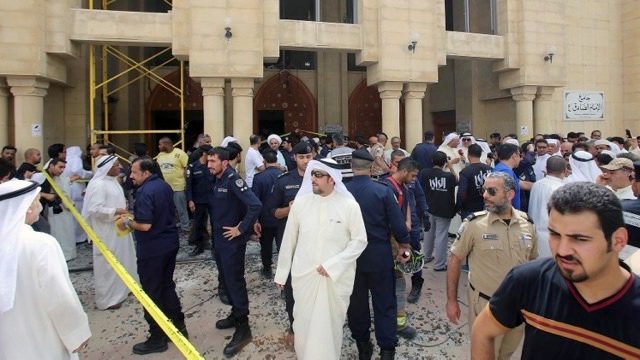SUMMARY
This is AI generated summarization, which may have errors. For context, always refer to the full article.

KUWAIT CITY, Kuwait (4TH UPDATE) – An Islamic State (ISIS) suicide bomber struck a Shiite mosque in the Kuwaiti capital during Friday prayers, killing 27 people as the Gulf state declared an “all-out confrontation” with terrorism.
Health Minister Ali al-Obaidi told Kuwait Television the number of dead had risen to 27 in addition to 227 wounded in the first ever suicide attack on Shiite mosques in the oil-rich emirate.
The toll in the attack, carried out in the Muslim holy fasting month of Ramadan, is one of the largest in Kuwait’s history.
The interior ministry said an unspecified number of suspects were held for questioning in connection with the attack that shocked the society of this small oil-rich Gulf state. No details were provided.
The funerals of those killed in the attack will take place on Wednesday.
The cabinet announced after an emergency meeting that all security agencies and police have been placed on alert to confront what it called “black terror”.
“The cabinet stresses that it will take whatever measures necessary to root out this scourge, and declares a relentless all-out confrontation with these terrorists,” said a statement after the meeting.
It also declared Saturday a day of mourning.
Shiite activist Abdulwahed Khalfan told AFP that security at Shiite mosques was beefed up and citizens’ committees have been formed.
The committees will inspect people entering mosques and refuse entry to those unknown to them, Khalfan said.
Kuwaiti Shiites make up around one third of the country’s native population of 1.3 million.
The IS-affiliated group in Saudi Arabia, calling itself Najd Province, said militant Abu Suleiman al-Muwahhid bombed the mosque which it claimed was spreading Shiite teachings among Sunni Muslims.
ISIS, a radical Sunni group, considers Shiites to be heretics.
The Najd Province group has claimed similar bombings at Shiite mosques in Saudi Arabia in recent weeks.
After the attack, a security official said “it is a suicide bombing”, and witnesses said a suicide bomber entered the mosque during weekly noon prayers.
Horrific pictures
The mosque’s senior cleric, Abdullah al-Mazeedi, told KUNA news agency the bombing targeted the rear rows of worshippers who numbered around 2,000 altogether.
He said the blast damaged the interior and caused several chandeliers to fall.
The emir, Sheikh Sabah al-Ahmad al-Sabah, immediately visited the site, and footage on state-run television showed him visibly moved by the carnage.
He later said that the “criminal attack is a desperate and evil attempt targeting Kuwait’s national unity”.
The channel broadcast footage of the destruction, and people posted online horrific pictures of the dead and wounded.
Three weeks ago, the ministry said it had boosted security around mosques following the bombings in neighbouring Saudi Arabia.
Friday’s attack was widely condemned.
Parliament speaker Marzouk al-Ghanem also called the attack “black terror” and said the unity of Kuwaitis would foil any plot.
‘Heinous crime’
The two mainstream Sunni groups, the Islamic Constitutional Movement (ICM) and the Islamic Salaf Alliance, denounced the attack.
The ICM, political arm of the Muslim Brotherhood, decried the bombing as a “low criminal attack targeting the mosque”.
A statement from the second group said: “The Islamic Salaf Alliance strongly deplores this heinous crime which is carried out only by traitors.”
Kuwait’s leading Sunni cleric, Sheikh Ajeel al-Nashmi, said on Twitter that the bombing was a “criminal act aimed at sowing seeds of discord, and undoubtedly Shiites and Sunnis will foil the terrorists’ plot”.
Independent MP Sultan al-Shemmari called on the government to “hit the terrorists with an iron fist”.
Over the past few weeks, Kuwaiti courts have tried a number of people on charges of belonging to IS and sentenced at least one to several years in jail.
Several countries and organisations deplored the bombing.
The White House condemned “heinous attacks” in France, Kuwait and Tunisia, expressing solidarity and vowing to “fight the scourge of terrorism”.
UN Secretary-General Ban Ki-moon and the Security Council on Friday strongly condemned the attacks in France, Kuwait and Tunisia and said those responsible must face justice.
Iraqi Prime Minister Haider al-Abadi said that “terrorist gangs are a threat to all, and countries in the region and the world must seriously contribute to fighting them”.
Iran said “terrorist” attacks are the main threat to regional security and stability.
The six-nation Gulf Cooperation Council (GCC), to which Kuwait belongs, called the attack an attempt to undermine national unity and the stability of its members.
There was also condemnation from Egypt, Jordan, Qatar, Russia and Spain among others. – Rappler.com
Add a comment
How does this make you feel?
There are no comments yet. Add your comment to start the conversation.